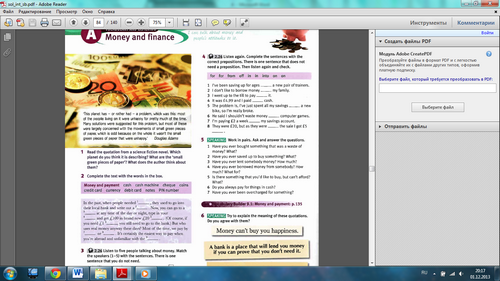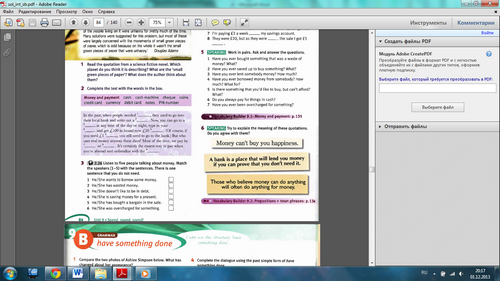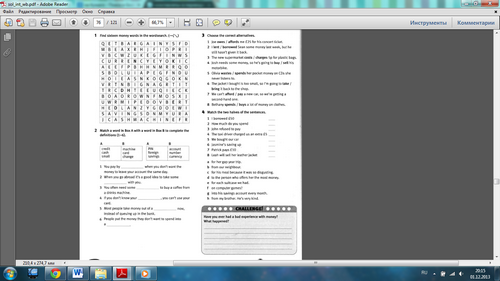- Учителю
- Урок английского языка для 8 класса «Мир покупок. Мир денег»
Урок английского языка для 8 класса «Мир покупок. Мир денег»
Урок английского языка в 8 классе на тему « Shopping: the world of money»
Цели:
обучающие (образовательные):
-
совершенствование лексических навыков;
-
развитие навыков и умений в чтении, говорении, аудировании;
развивающие:
-
развитие коммуникативных навыков;
-
развитие аналитических способностей учащихся: умение анализировать, сопоставлять, делать выводы;
воспитывающие:
-
обеспечить условия для воспитания положительного интереса к изучаемому предмету;
-
способствовать овладению необходимыми навыками самостоятельной учебной деятельности;
Ход урока:
Этап урока
Время
Речь учителя
Речь учащихся
Оснащенность
Примечания
-
Орг. момент,
Приветствие, сообщение целей и задач урока.
3 мин
Good afternoon, pupils! Seat down, please. Who is on duty today? What day is it today? Who is absent?
Yesterday, I had a bad experience with my pocket money as I lost it in the supermarket.
What topic will we discuss at the lesson to your mind?
That`s right.
Good afternoon, teacher!
Today we`ll continue talking about shops and money.
Доска, компьютер
-
Мотива-ция. Разминка
5 мин
At the beginning of the lesson let's have some phonetic practice. You see a short poem called limerick. It is a five-line humorous poem with an AABBA rhyme scheme. It's about 500 years old. Now, listen to me, please:
My dad had a sister named Maud
who surprised us when she wed a lord.
She became a real lady
even if he was shady,
with her money he vanished abroad.
…, read aloud, please.
On your papers you see lines from two limericks, which are mixed. Read them and try to make up two poems. Work in pairs, please.
Are you ready? The first one, please, read ….
I have not enough cash for the rent,
But the copy he wrote
Like a river fast flowing
was so good he is now in Sing Sing.
The money I had is all spent.
A newspaper man named Fling
of a five dollar note
I shall have to stop living for lent!
Could make "copy" from any old thing.
the money kept going,
1.I have not enough cash for the rent,
the money I had is all spent.
Like a river fast flowing
the money kept going,
I shall have to stop living for lent!
2.A newspaper man named Fling
could make "copy" from any old thing.
But the copy he wrote
of a five dollar note
was so good he is now in sing sing.
Запись на доске
Карточки
-
Основная часть
-
topical vocabulary
10 мин
The limericks were about money. We use money every day for different things. But where do people keep their money?
P1, where do you keep your pocket money?
Open your books at page 130; the first part of topical vocabulary is dedicated to a bank system.
Please, read, why people go to the bank and translate.
Do you think loans are the main reason to go to a bank?
What else can a person use a bank for?
So what a person do if he comes to a bank to save money?
Read and translate, please.
And there are some other things that a bank can do for you, what are they?
…
… to save money
-
listening and
speaking
22 мин
Work in groups; write as many verbs that collocate with money as you can. Two minutes are for you. Please, tell us what verbs have you written.
Now, please, look at the papers, you see the quotation from a science fiction novel. Read it and try to answer the questions in ex.1 in pairs.
Look at ex.2, read the words in the box and translate them. Complete the text with the words in the box.
Now we are going to listen to five people talking about money. Your task is to match speakers with the sentences in ex 3.
Let's listen to the tape one more time and complete the sentences in ex. 4 with the correct prepositions.
In ex.5 you see some quotations about money. Please read the first one. Translate it. What does it mean? Do you agree with it?
spend, save, invest, borrow, lose, lend, waste, inherit, win, bet, earn, change, donate, pay, make
pretty much (a lot)
concerned with (worried)
odd (strange)
on the whole (generally)
Представтель группы зачитывает слова
См. приложение (раздаточный материал)
4. Завершающий этап. Рефлексия
5 мин
What have you learnt today?
Make a sinkveyn on the theme of our lesson in pairs, please.
Write down your home task: ex 2-4 (list).
The lesson is over. Thank you.
Пример синквейна:
Money
Important, necessary
Cash, earn, lend
Money makes the man.
Payments
Выдать памятки со структурой синквейна.
Вывешивают синквейны на доску и зачитывают их.
Приложение


Домашнее задание
